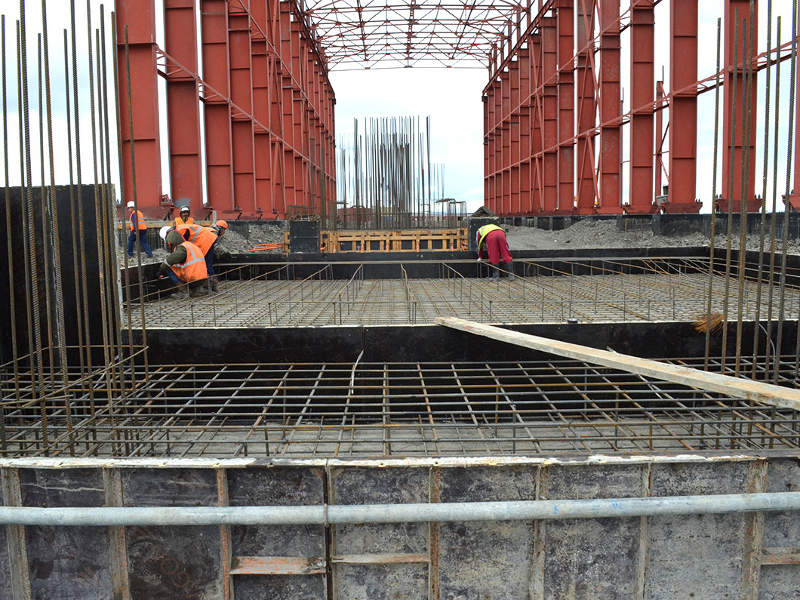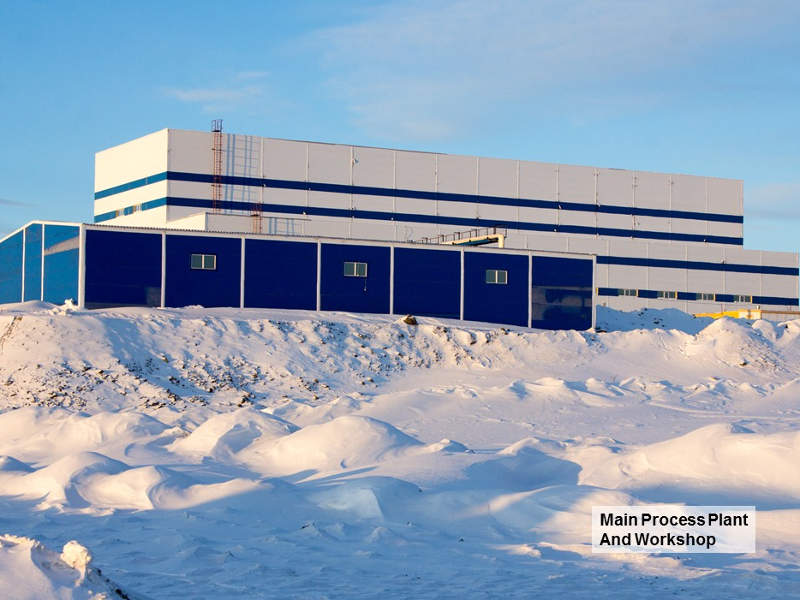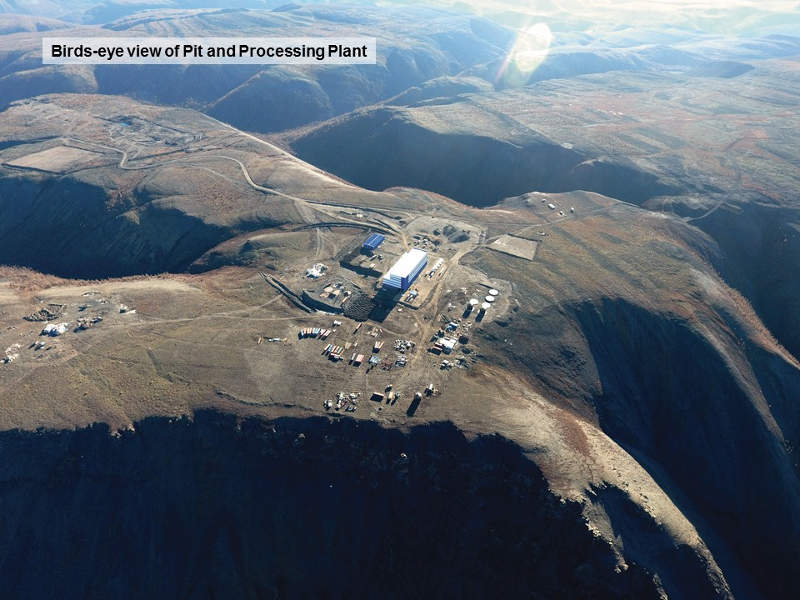The Mangazeisky silver project is located 400km north of Yakutsk, Sakha, Russia, and includes the Vertikalny deposit, which is one of the world’s highest grade silver deposits.
Silver Bear acquired the property in 2004 and was granted a 20-year mining licence for the Vertikalny deposit in September 2013, and received a seven-year extension for its exploration licence. The project is expected to produce 17.09 million ounces (Moz) of silver at an average production rate of 2.18Moz a year through its life time of 7.8 years.
Construction of the mine commenced immediately after the completion of the feasibility study in October 2016. The project received the receipt of the licence for usage and storage of hazardous chemical materials for its Mangazeisky Silver Project in January 2018.
Silver Bear filed the updated feasibility study in August 2017, and anticipates first silver production in the first quarter of 2018.
Mangazeisky silver mine location, geology and mineralisation
Mangazeisky is a combined open-pit and underground project falling within the Mangazeisky Exploration licence covering a 35km mineralised structural corridor.
The mine property is a part of the Verkhoyansk mobile belt of north-eastern Yakutia and contains a number of explored areas with the mineral occurrences. The fold-and-thrust belt forms part of a major orogenic system, which comprises numerous gold and silver deposits.
Four mineralisation types have been identified at Mangazeisky, namely Vertikalny, Mangazeisky North and South, Nizhny Endybal and Strezhnevoy, and Porfirovy.
The Vertikalny mineralisation is made up of narrow, steep-dipping veins that cross-cut stratigraphy and contains ore with high grades of more than 1,000g/t silver. Silver-bearing quartz-carbonate-sulphide structures, along with lead and zinc by-products are widely spread in the North and South mineralisation types.
The Nizhny Endybal and Strezhnevoy mineralisation comprises thicker linear-type stock work areas with carbonate-silver sulphosalt mineralisation. Porfirovy mineralisation type comprises a porphyry area associated with quartz, quartz-carbonate and quartz-sulphide veins and veinlets, hosted by extrusive rhyolite porphyry.
Reserves at the Mangazeisky silver project
The Mangazeisky open-pit and underground mine is estimated to contain proven and probable ore reserves of 22.31 million troy ounces (Mtoz) of silver grading 809g/t.
Mining at Mangazeisky
Conventional mining method comprising drill and blast, followed by load and haul, will be applied at the open-pit mine, which will be operated for the first four years.
The open-pit is proposed to be developed as two separate pits namely North and South pits. The North pit will be developed in two phases, while the South Pit is proposed to be mined in a single phase.
Run-of-mine ore from the open-pit will either be hauled directly to the crusher or stockpiled next to the crusher for further use.
Long-hole open stoping method is proposed for underground mining operations at Mangazeisky. The underground mine, classified into North Zone and South Zone, will be accessed through a main access decline in the North Zone and a series of in-pit adits in the South Zone.
Load-haul-dumping machines (LHD) will be used to dump underground rock into the haul trucks and transport to the surface.
Ore processing
Ore from the mine will pass through a standard crushing and milling circuit and the crushed material will be directly fed into the ball mill via a feed conveyor belt and feed hopper.
The ball mill will be a standard open discharge mill operating in closed circuit with two stages of hydro-cyclones in order to produce a ground product suitable for the downstream gravity concentration.
The gravity concentrates will be processed by intensive cyanidation in a Consep ACACIA intensive leach reactor.
The leached slurry from the tank leach and intensive cyanidation will pass through a counter current decantation washing system and the resulting pregnant solution will be processed by direct electro-winning to recover the silver metal.
Infrastructure facilities at Mangazeisky
Major infrastructure facilities at the project will include an airstrip, access road, TMF, borehole water supply and distribution, water treatment, process and ancillary facilities, power supply and distribution network, and communications infrastructure.
Access to the Mangazeisky mine is provided through a winter road usable from December until mid-April. The project is utilising all-terrain vehicles (ATVs) for transporting workers and materials to the site.
As part of the logistics supply line, the Batamai Port on the northern bank of the Lena River will be upgraded to enable the stockpiling of containerised consumables and fuel during the summer months.
The mine also has the facility to transport equipment and supplies through the Amur-Yakutsk Mainline, a branch line off the Trans-Siberian Railway, running along Yakutsk.
Financing for the Russian silver project
Aterra and Inflection, the major shareholders of Silver Bear Resources, agreed to provide an additional $20m for the silver mine development in November 2017. The funding is in addition to the $15m and $55m facilities agreement entered in February 2017 and August 2016 respectively with Silver Bear Resources and its indirect wholly owned Russian subsidiary, Prognoz.
The companies also agreed to extend the maturity date of the Facilities Agreement to 20 March 2022.
The shareholders of the Silver Bear Resources include Inflection (25.3%), Aterra Capital (24.9%), Free Float (31.8%), and other institutions (15.9%).
Key players involved with the Mangazeisky silver project development
Tetra Tech, SRK Consulting, and Environmental Resource Management (ERM) Consultants participated in preparing the NI 43-101 feasibility study for the Vertikalny deposit of Mangazeisky silver project.
ERM also conducted the environmental and social impact assessment (ESIA) and scoping study for the mine, while Tetra Tech prepared the technical report.
ZAO Prognoz was engaged to conduct the open-pit mining operation, along with providing maintenance and technical services.
TOMS Engineering was engaged to conduct the TEO Konditsy study, the first part of the Russian feasibility study, along with the metallurgical test work and process flowsheet development.
EMC Mining was awarded the contract to provide engineering services for the processing facility and associated mine site infrastructure.






